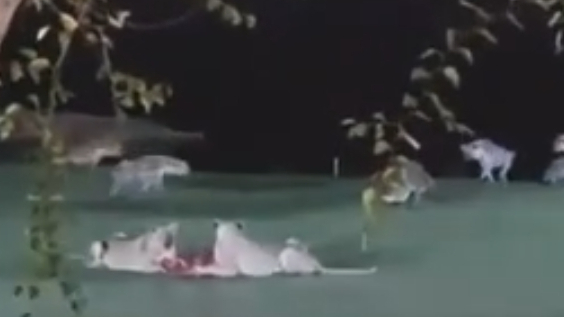Watch As Lions And Crocodile Share Feast On Green Of ‘Wildest Course In The World’
Diners in the clubhouse of Skukuza Golf Club in South Africa watched as the feeding frenzy played out on the 18th green


Skukuza Golf Club in South Africa is the self-proclaimed “wildest course in the world,” and few will argue with that after it more than lived up to its billing during a feeding frenzy on the 18th green involving an array of the local wildlife as visitors watched in awe.
The course, which is located in Kruger National Park, had shut for the day, leaving those on the patio of the clubhouse overlooking the green to enjoy a peaceful evening of dining - or that would have at least been the plan.
Instead, they were treated to an impromptu feeding frenzy, which started after two lionesses killed an impala and began gorging on the feast, with the whole thing captured on video.
The close-up sight of a pair of the big cats alone would surely have been enough to leave most in awe of what they had seen, but the show was just about to begin.
Shortly afterwards, a huge crocodile began crawling towards the animals, which, perhaps not surprisingly, led to the lionesses making a hasty exit, leaving some of their supper behind. Sure enough, the reptile began snapping its jaws as it gulped down what was left of the impala.
At that point, you would have thought any other animals in the vicinity would have left the reptile to its meal, but a group of hyenas had other ideas, excitedly running nearby the crocodile, until it gave one of them a gentle warning as to who was boss and continued eating before settling down on the green, presumably to let the meal settle.
It’s certainly not uncommon to find a dangerous animal on a golf course, with some terrifying instances from rattlesnakes to alligator sightings in recent years.
Subscribe to the Golf Monthly newsletter to stay up to date with all the latest tour news, equipment news, reviews, head-to-heads and buyer’s guides from our team of experienced experts.
Because of that, the Rules of Golf even take account of the eventuality, with Rule 16.2 – Dangerous Animal Condition - allowing for free relief should your ball rest near one, stating: “A “dangerous animal condition” exists when a dangerous animal (such as venomous snakes, stinging bees, alligators, fire ants or bears) near a ball could cause serious physical injury to the player if they had to play the ball as it lies.”
However, the wildlife inhabiting the area around Skukuza Golf Club is clearly on another level entirely!

Mike has over 25 years of experience in journalism, including writing on a range of sports throughout that time, such as golf, football and cricket. Now a freelance staff writer for Golf Monthly, he is dedicated to covering the game's most newsworthy stories.
He has written hundreds of articles on the game, from features offering insights into how members of the public can play some of the world's most revered courses, to breaking news stories affecting everything from the PGA Tour and LIV Golf to developmental Tours and the amateur game.
Mike grew up in East Yorkshire and began his career in journalism in 1997. He then moved to London in 2003 as his career flourished, and nowadays resides in New Brunswick, Canada, where he and his wife raise their young family less than a mile from his local course.
Kevin Cook’s acclaimed 2007 biography, Tommy’s Honour, about golf’s founding father and son, remains one of his all-time favourite sports books.
